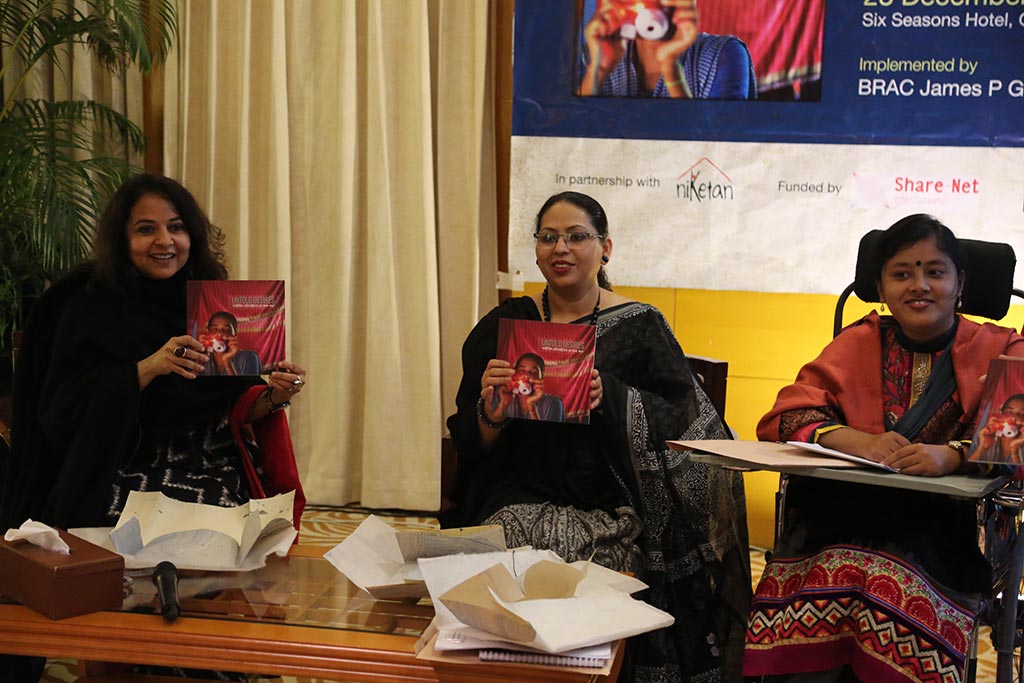Launching of Untold Desires: A Photo-book on Disability and Sexuality in Bangladesh
On December 28, 2017, BRAC James P Grant School of Public Health, BRAC University launched the photo-book titled ‘Untold Desires.’ The book looks at narratives of physically disabled people between the ages of 20-40, and their perceptions around love, romance, intimacy and sexuality. Special guests Mashfiqua Zaman Satiar, Senior adviser, Gender and SRHR of the Embassy of the Kingdom of the Netherlands, and Sabrina Sultana, President of B-Scan were present at the event. Dr. Sabina Faiz Rashid, Dean, BRAC James P Grant School of Public Health, BRAC University, along with the special guests, launched the book at the event. Spokespersons, practitioners and researchers from different organizations working on SRHR, disabilities, media and education, attended the launching ceremony.
This eponymous publication is the culmination of the scoping study titled ‘Exploring sexuality of physically disabled people through photo-narratives in Bangladesh,’ conducted by researchers Saad Khan and Farhana Alam at the School, in partnership with Niketan, a Dutch organization that works with disabled children in Bangladesh and Netherlands. The project is funded by Share-Net International.
The project is unique for many reasons. It questions the stereotypical perceptions of the society who thinks disabled people are devoid of sexual desire. The book brings forth ten narratives of individuals with disabilities such as cerebral palsy, post-polio syndrome, amputation, muscle weakness, clubfoot and spinal cord injury. The narratives explore how disabilities of the participants intersect and influence with their experiences and understandings around sexuality, desire and romance. The book looks at perceptions of Nayeem, a man with spinal cord injury, who negates understandings of masculinity and normative ideas around sexual performance, and navigates with a view that sex comprises of aspects of emotions and touch, and not simply sexual intercourse; or how Shukla, a woman with post-polio syndrome, sexually fantasizes about the man she has been speaking with over the phone, and never wants to get married; or Ayesha, with post-polio syndrome, who thinks that men in Bangladesh needs to know more about sex and intimacy, and should be more sensitive and responsive towards their partners’ needs.
The study brings forth a discourse around disability and sexuality that is not reliant on the framework of violence and abuse, but of sexual agency and empowerment. The participants were also given cameras to visually document their perceptions of love, romance and sexuality. The photographs are glimpses to the lived realities and voices of the participants. The photographs, along with the narratives also stand as strong advocacy tools to bring in the idea that disabled people are sexual beings, and have sexual rights that need to be thought of and talked about. The photo-narratives are also creative expressions of how stories can be told, to engage people beyond the academia. The book, which looks like a coffee table book, is meant to be used among youths (disabled and able-bodied) to initiate discussions on gender, sex, sexuality and disability in ways that are non-stigmatizing.
Special guest Subrina Sultana from B-Scan shares her personal story to reflect upon perceptions about disabled people in the Bangladeshi society. She said that disability is part of human diversity. She also spoke of how disabled women are silenced when it comes to expressing one’s sexual desire. She also touched upon the importance of creating awareness about sexuality among caregivers.
The program ended with views from the guests, among many of whom praised the initiative. Many also suggested that workshops around disability and sexuality be organized in their own organizations, while many came forth to also mention that they are going back with new ways of thinking that will help them to design more inclusive programs and interventions on disability and SRHR.

